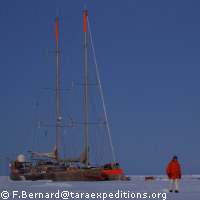Arctic research boat heads home
The polar research boat Tara is on its way home after spending a year and a half encased in the Arctic sea ice. During that time the ship's crew has collected vast amounts of data on the Arctic environment for the EU-funded DAMOCLES ('Developing Arctic modelling and observing capabilities for long-term environmental studies') project. The goal of the expedition was to drift across the Arctic on the pack ice, collecting data on the ice, the ocean and the atmosphere along the way. During her voyage, Tara covered over 4,000 km and drifted to within 160 km of the North Pole. The boat's owner is Etienne Bourgois, Managing Director of the French fashion company agnès b. He bought the boat in 2003 with the dream of following in the footsteps of the Norwegian explorer Fridtjof Nansen, who drifted with the pack ice across the Arctic in the polar boat Fram at the end of the 19th century. When the company director was introduced to the coordinator of the DAMOCLES project, the oceanographer Jean-Claude Gascard, the two quickly realised that their projects would both be enhanced by the involvement of the other. The speed of Tara's voyage is a major scientific result in itself; when she entered the pack ice off the North coast of Siberia in September 2006, the expedition organisers expected the crossing to last around two years. In fact, she sailed free of the ice on 21 January 2008, some six months ahead of schedule. 'We drifted quite a bit faster than expected,' commented Grant Redvers, the Chief of Expedition, who has been on board Tara throughout her epic journey. The schooner is equipped with an array of scientific instruments designed to gather data from the depths of the ocean to the upper reaches of the atmosphere. Among other things, the crew have been collecting information on the temperature and salinity of the ocean, the ice composition and thickness, air pollution and the arctic wildlife. Carrying out this work in the harsh arctic environment was extremely challenging, as temperatures plummeted to -42°C and the polar night enveloped the ship in darkness for several months of the year. 'There was also a lot of physical work - keeping ice holes open for example,' Mr Redvers told CORDIS News. The arctic summer brought different challenges, namely the formation of melt pools and ice fracturing, he added. Polar bears presented another source of danger for those working out on the ice. The treacherous nature of the ice revealed itself early on in the expedition, when a violent storm broke up the ice pack, scattering the instrumentation and equipment which had been set up on the ice. Fortunately, the crew were able to recover most items. Although the full results of these experiments and measurements will not be known for some months, some outcomes are already clear. For example, the gradual disappearance of perennial sea ice and its replacement with new (first year) ice can be confirmed. The ice is also becoming thinner and more dynamic, and in summer melt ponds now cover over half of the surface of the ice pack. All of these observations indicate that the fragile arctic environment is changing fast. So while the scientists' task of analysing the masses of data is just beginning, for the crew of Tara, the expedition is drawing to a close. After a brief stopover in Spitsbergen, the boat is now sailing south and is due to arrive in her home port of Lorient, France, on 23 February. 'It's been a fantastic adventure for us all and it's going to be interesting to see the results from the data we've collected,' said Mr Redvers. Asked what he would miss most from his time in the far North, he cited the sense of freedom he found living in such an isolated wilderness. 'We had a wonderfully free lifestyle in our little world,' he explained. Meanwhile, he is looking forward to being reunited with family and friends, and taking a well earned break in his native New Zealand. After that, he will no doubt return to the poles. 'I'm passionate about polar regions and polar science,' he said.



